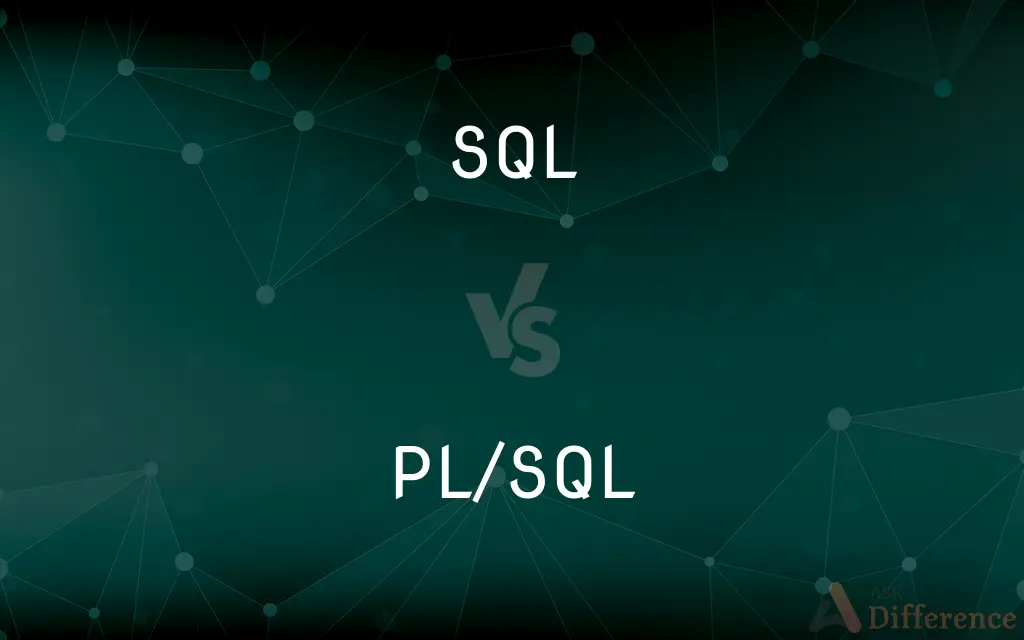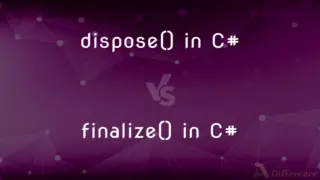SQL vs. PL/SQL — What's the Difference?
By Tayyaba Rehman — Published on January 9, 2024
SQL (Structured Query Language) manages and retrieves data from databases. PL/SQL (Procedural Language/Structured Query Language) extends SQL, allowing procedural constructs like loops and conditions for more complex database operations.

Difference Between SQL and PL/SQL
Table of Contents
ADVERTISEMENT
Key Differences
SQL, a standard database query language, manages, retrieves, and manipulates data within databases using declarative statements. PL/SQL, an extension of SQL, incorporates procedural constructs like loops and conditions, enabling more complex operations, data manipulation, and programmatic logic within databases.
SQL operates with declarative statements like SELECT, INSERT, UPDATE, and DELETE for database operations, focusing on data retrieval and manipulation. PL/SQL extends SQL by incorporating procedural constructs, allowing the creation of stored procedures, functions, and triggers, enhancing database functionality.
SQL is primarily used for database queries, data retrieval, and manipulation, providing a foundation for managing structured data. PL/SQL, on the other hand, extends SQL by incorporating procedural capabilities, making it suitable for developing complex logic within databases.
In SQL, queries are executed one statement at a time, focusing on data retrieval and manipulation with simple, single-step operations. In contrast, PL/SQL enables the creation of complex, multi-step operations with the integration of procedural constructs for more intricate data processing within databases.
SQL statements are concise, focusing on retrieving specific data or performing single data manipulation tasks within databases. PL/SQL allows the development of robust applications within the database, integrating procedural elements for handling complex business logic and data processing.
ADVERTISEMENT
Comparison Chart
Purpose
Data retrieval and manipulation in databases
Extends SQL with procedural constructs for complex operations
Functionality
Focuses on declarative statements
Incorporates procedural elements like loops and conditions
Use Cases
Foundation for managing structured data
Development of complex logic and applications in databases
Execution
Single-step operations
Multi-step operations with procedural constructs
Complexity
Primarily single data manipulation tasks
Enables robust application development within databases
Compare with Definitions
SQL
Language for managing and retrieving data from databases.
SQL queries retrieve specific information from databases.
PL/SQL
Enables writing stored procedures for database operations.
PL/SQL procedures automate tasks in the database.
SQL
Enables querying databases to retrieve specific information.
SQL selects specific columns from database tables.
PL/SQL
Supports conditional statements like IF-THEN-ELSE.
PL/SQL executes different actions based on conditions.
SQL
Utilized for data manipulation tasks like INSERT and UPDATE.
SQL statements update records in the database.
PL/SQL
Incorporates procedural elements for complex operations.
PL/SQL functions perform calculations within the database.
SQL
Primarily used for managing relational databases.
SQL commands create and modify database tables.
PL/SQL
Integrates procedural logic within SQL for data processing.
PL/SQL triggers manage data changes based on defined conditions.
SQL
Focuses on structured query statements for data retrieval.
SQL queries filter data based on specified conditions.
PL/SQL
Extends SQL with procedural constructs like loops.
PL/SQL allows creating loops for repetitive tasks in databases.
Common Curiosities
Can SQL be used for creating applications?
While SQL focuses on database querying and manipulation, it's not designed for building standalone applications.
How does PL/SQL extend SQL?
PL/SQL extends SQL by incorporating procedural constructs like loops, conditions, and stored procedures for complex database operations.
What advantages does PL/SQL offer over SQL?
PL/SQL's procedural elements allow for creating complex logic within databases, automating tasks, and handling business processes.
Does SQL support programming logic?
SQL focuses on querying databases and data manipulation but lacks procedural programming elements like loops and conditions.
How does SQL handle data retrieval?
SQL retrieves specific data using SELECT statements, allowing filtering, sorting, and querying based on specified criteria.
What is the primary function of SQL?
SQL is primarily used for managing, retrieving, and manipulating data within databases using declarative statements.
Can PL/SQL be used for building standalone applications?
While primarily used within databases, PL/SQL can support the development of applications that interact closely with database systems.
Is SQL specific to certain types of databases?
No, SQL is a standard language for managing relational databases and is widely used across different database systems.
Can SQL support transaction management?
Yes, SQL includes commands like COMMIT and ROLLBACK for managing transactions, ensuring data integrity within databases.
Can SQL manipulate data in databases?
Yes, SQL supports data manipulation operations like INSERT, UPDATE, DELETE, and SELECT for managing data within databases.
Can PL/SQL execute multiple SQL statements together?
Yes, PL/SQL enables the execution of multiple SQL statements together within procedural blocks for complex database operations.
How does PL/SQL handle complex data processing?
PL/SQL incorporates procedural constructs like loops and conditions, allowing for complex data processing and logic implementation.
Can SQL statements be used for conditional operations?
SQL supports conditional operations to filter data using WHERE clauses but lacks the complexity of procedural conditions.
What is the significance of stored procedures in PL/SQL?
Stored procedures in PL/SQL allow for encapsulating complex logic, enabling reusability and efficient database operations.
Can PL/SQL handle data manipulation?
Yes, PL/SQL can perform data manipulation operations like inserting, updating, and deleting records within the database.
Share Your Discovery

Previous Comparison
PGP vs. S/MIME
Next Comparison
dispose() in C# vs. finalize() in C#Author Spotlight
Written by
Tayyaba RehmanTayyaba Rehman is a distinguished writer, currently serving as a primary contributor to askdifference.com. As a researcher in semantics and etymology, Tayyaba's passion for the complexity of languages and their distinctions has found a perfect home on the platform. Tayyaba delves into the intricacies of language, distinguishing between commonly confused words and phrases, thereby providing clarity for readers worldwide.














































